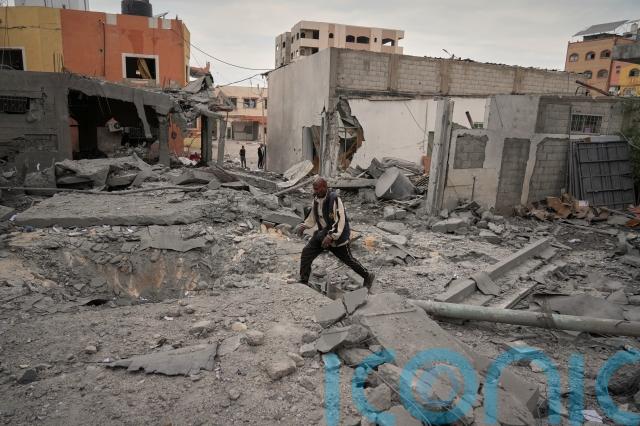
Israel’s defence minister has said troops will remain in so-called security zones in the Gaza Strip, Lebanon and Syria indefinitely.
The remarks by Israel Katz could further complicate talks with Hamas over a ceasefire and hostage release.
Mr Katz said Israeli forces “will remain in the security zones as a buffer between the enemy and (Israeli) communities in any temporary or permanent situation in Gaza – as in Lebanon and Syria”.
He said: “Unlike in the past, the (Israeli military) is not evacuating areas that have been cleared and seized.”
Lebanese president Joseph Aoun said that Israel’s continued presence in some areas in Lebanon was “hindering” the Lebanese army’s full deployment as required by the ceasefire negotiated with Israel. The war left over 4,000 people dead, many of them civilians.
Two Israeli drones strikes on Wednesday in southern Lebanon killed two people, the health ministry said. The UN said Israeli strikes in Lebanon have killed more than 70 civilians since the ceasefire took effect in November.
After over 16 months of war, Gaza is in ruins.
Yet our partners @ACF_France, @WFP, @UNICEFpalestine, @WHO, @UNRWA & @ifrc are still there—providing water, food, shelter, education and care, often at great personal risk.
Read more ⬇️
— EU Civil Protection & Humanitarian Aid 🇪🇺 (@eu_echo) April 16, 2025
Also on Wednesday, Israeli strikes across Gaza killed another 22 people, according to local health officials, including a girl who was not yet one year old.
Ahlam Seiam’s mother, who was injured in the strike, embraced her daughter, still wearing a bloodied blue and white dress, before she was taken for burial.
Israeli forces have taken over more than half of Gaza in recent weeks in a renewed campaign to pressure Hamas to release hostages after Israel ended their ceasefire last month.
UNRWA continues to provide health and psychosocial support services in #Gaza, despite the ongoing forced displacement and Israeli-imposed siege.
Eight UNRWA health centres and 39 UNRWA medical points remain operational.
Medicines are rapidly running out in Gaza. Aid and… pic.twitter.com/SUDcfptvzt
— UNRWA (@UNRWA) April 15, 2025
Israel has also refused to withdraw from some areas in Lebanon following a ceasefire with the Hezbollah militant group last year, and it seized a buffer zone in southern Syria after the overthrow of President Bashar Assad.
Israel says it must maintain control of such territories to prevent a repeat of the Hamas attack that triggered the latest conflict.
The war began when Hamas-led militants attacked southern Israel on October 7 2023, killing some 1,200 people, mostly civilians, and abducting 251.
Fifty-nine hostages are still inside Gaza, 24 of whom are believed to be alive, after most of the rest were released in ceasefire agreements or other deals.
On Wednesday, the Palestinian Islamic Jihad militant group released a video of hostage Rom Braslavski.
It was the first sign of life of him, though recently released hostages had said they had seen him in captivity.
In the video, which was filmed under duress, Mr Braslavski says he was held in terrible conditions and pleads with Israeli Prime Minister Benjamin Netanyahu to stop the war and allow humanitarian aid into Gaza.
The main organisation representing families of the hostages said earlier in a statement: “They promised that the hostages come first. In practice, Israel is choosing to seize territory before the hostages.
“There is one solution that is desirable and feasible, and that is the release of all the hostages at once as part of an agreement, even at the cost of ending the war.”

Israel’s retaliatory offensive has killed more than 51,000 people, according to an updated toll released by Gaza’s health ministry on Tuesday.
That includes more than 1,600 people killed since Israel ended a ceasefire and resumed its offensive last month to pressure Hamas to accept changes to the agreement.
Mr Netanyahu has vowed to annihilate Hamas and return the 59 hostages still in Gaza.
He has said that Israel will then implement US President Donald Trump’s proposal for the resettlement of much of Gaza’s population in other countries through what Mr Netanyahu refers to as “voluntary emigration”.
Mr Netanyahu helms the most nationalist and religious government in Israel’s history, and his coalition partners have called for the reestablishment of Jewish settlements in Gaza.
Israel withdrew from Gaza in 2005 and dismantled its settlements there.
Arab countries and Palestinians have universally rejected Mr Trump’s proposal, which human rights experts say would likely violate international law.
Palestinians in Gaza say they do not want to leave, and fear another mass expulsion like the one that occurred during the war surrounding Israel’s creation in 1948.
Subscribe or register today to discover more from DonegalLive.ie
Buy the e-paper of the Donegal Democrat, Donegal People's Press, Donegal Post and Inish Times here for instant access to Donegal's premier news titles.
Keep up with the latest news from Donegal with our daily newsletter featuring the most important stories of the day delivered to your inbox every evening at 5pm.